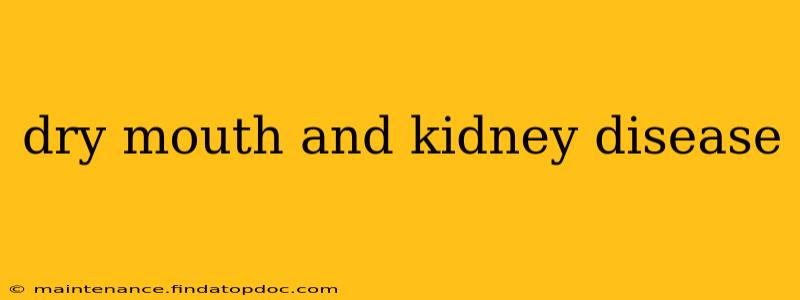Dry mouth, also known as xerostomia, is a common symptom affecting millions worldwide. It's characterized by a persistent feeling of dryness in the mouth, often leading to discomfort, difficulty swallowing, and an increased risk of oral infections. While numerous factors can cause dry mouth, including medication side effects and dehydration, it can also be a significant indicator of underlying health problems, including kidney disease. This article explores the intricate connection between dry mouth and kidney disease, answering frequently asked questions to provide a comprehensive understanding of this often overlooked symptom.
What causes dry mouth in kidney disease?
Dry mouth in the context of kidney disease isn't directly caused by the kidneys themselves failing to produce saliva. Instead, it's often a consequence of the disease's impact on overall bodily functions and the treatments employed. Several factors contribute:
-
Dehydration: Kidney disease can impair the body's ability to regulate fluid balance, leading to dehydration. Dehydration is a major culprit behind dry mouth. The kidneys play a crucial role in maintaining hydration, and their malfunction can disrupt this process.
-
Medication Side Effects: Many medications used to treat kidney disease, such as diuretics (water pills), can have dry mouth as a side effect. These medications increase urine production, which can lead to fluid loss and subsequent dryness.
-
Uremia: In advanced stages of kidney disease, a buildup of waste products in the blood (uremia) can occur. While the exact mechanism isn't fully understood, uremia has been associated with various changes in the body, including those affecting salivary glands.
-
Nutrient Deficiencies: Kidney disease can interfere with the absorption and utilization of essential nutrients, including those crucial for healthy saliva production. Deficiencies in vitamins and minerals can contribute to dry mouth.
-
Nausea and Vomiting: Kidney disease often leads to nausea and vomiting, causing further fluid loss and exacerbating dry mouth.
Can dry mouth be a sign of kidney failure?
While dry mouth isn't a definitive sign of kidney failure, it can be a contributing symptom, particularly in conjunction with other indicators. It's crucial to remember that dry mouth alone doesn't diagnose kidney failure. Other symptoms like fatigue, swelling in the legs and ankles, changes in urination patterns, and persistent itching should also be considered. A healthcare professional can properly assess these symptoms and conduct necessary tests to diagnose kidney disease.
How is dry mouth treated in people with kidney disease?
Treatment for dry mouth in kidney disease depends heavily on the underlying cause and the severity of the kidney disease. Approaches often involve:
-
Addressing Underlying Causes: This is the most critical step. Managing dehydration through increased fluid intake (always consulting with a nephrologist regarding fluid restrictions) and addressing medication side effects in consultation with a physician are essential.
-
Saliva Stimulants: Your doctor might recommend saliva stimulants, which are medications or products that help increase saliva production.
-
Artificial Saliva: Artificial saliva substitutes can help alleviate dry mouth symptoms by providing temporary lubrication.
-
Oral Hygiene: Maintaining excellent oral hygiene is crucial to prevent infections that are more common with dry mouth. This includes regular brushing and flossing, as well as using fluoride mouthwashes.
-
Dietary Changes: Certain dietary adjustments can help improve hydration and overall health, such as increasing your intake of fruits and vegetables containing water.
What other symptoms accompany dry mouth in kidney disease?
Dry mouth is rarely an isolated symptom in kidney disease. It often accompanies other noticeable signs and symptoms, including:
- Fatigue and weakness
- Swelling (edema) in the legs, ankles, and feet
- Shortness of breath
- Changes in urination (increased or decreased frequency, foamy urine)
- Itching (pruritus)
- Nausea and vomiting
- Loss of appetite
- Muscle cramps
- High blood pressure
When should I see a doctor about dry mouth?
If you experience persistent dry mouth, especially alongside other symptoms mentioned above, it's crucial to seek medical attention promptly. Dry mouth can indicate various underlying health issues, including kidney disease. Early diagnosis and treatment are essential for managing kidney disease effectively and preventing complications. Don't hesitate to consult your physician if you have concerns about your dry mouth.
Disclaimer: This information is for educational purposes only and should not be considered medical advice. Always consult with a healthcare professional for diagnosis and treatment of any medical condition.
